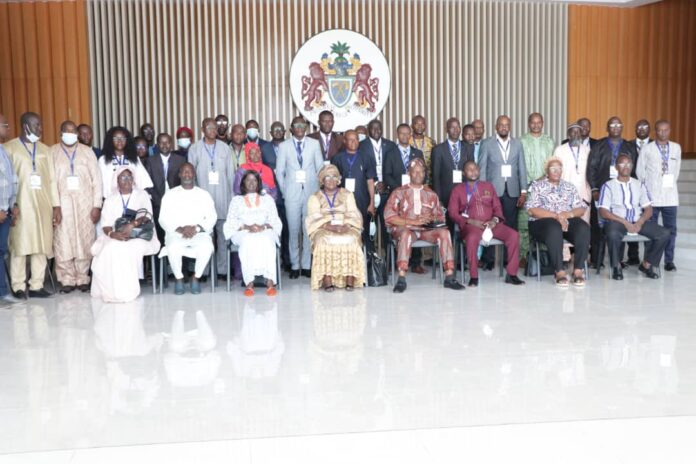By Mariama Marong
The United Nations Economic Commission for Africa (UNECA) on Tuesday, 9November, 2021 commenced the 24th session of the inter-governmental committee of senior officers and experts for West Africa.
The aim of the three day convergence was to discuss how recent changes have affected the economic and social development of West African countries and how to bounce back the sub-regional economy in the aftermath of the Covid-19 pandemic.
The Commission, which is mandated to promote the economic and social development of Africa, held their maiden event in the Gambia under the theme “leveraging the AfCTA implementation to building forward resilient and sustainable economy” in west Africa, during the Covid-19 era.
The Africa Continental Free Trade Area (AfCFTA) has laid the foundation to strengthen and accelerate intra-African trade, in the creation of a single market for trade in goods and services in accordance with the Pan African Vision of “an integrated, prosperous and peaceful Africa”, as enshrined in Agenda 2063.
Speaking at the event held at International Conference Center, Ngone Diop, the Director of the UNECA’ sub- regional office for West Africa, said the session brings together high level decision makers from member states to discuss their economic and social performances and make recommendations to members and other development stakeholders.
She highlighted on the essence of the session which seeks to build constructive professional feedback as experts and support as policy makers, in building the economy that the sub- region yearns for.
Madam Diop outlined the outcome of the forum as one that will be a very important milestone in the empowerment of youth and women.
“This dialogue is part of our platforms to discuss with you our work, in addressing the imperative of building forward a resilient and sustainable economy for West Africa,” she said.
She emphasized on the policies required to achieve inclusive and transformational development in West Africa and the pressing need to engage the youth.
“Our policy influences capacity to empower Africa’s youth while ensuring a gender balance society,” Madam Diop said; adding that Africa and West Africa in particular comprises a youthful population of about 60percent who are below the age of 25 years, and majority of these young people cannot find decent employment or even earn decent income.
“If this large cohort of young people cannot find decent employment or earn a decent income, this will turn into a demographic risk potential source of social discontentment and political instability, perpetuating the current challenges faced by the region,” she said; reiterating that appropriate measures should be taken to unlock the huge potential of the youth.
She lamented on the development challenges and the need for a strong partnership and political will for better coordination and collective work to ensure visible and impactful evidence based results.
In his remarks, the outgoing Chairperson of the Intergovernmental Committee of Senior Officers and experts (ICE), David Adeosun, said development is not an easy task and cannot be achieved without diligence; adding that to develop the sub-region, development-oriented policies and programs must be initiated, implemented and monitored to the latter, saying people have to engage in meaningful ventures.
Deputizing for the permanent secretary, Juldeh Ceesay, deputy permanent secretary at the Ministry of Finance and Economic Affairs, lauded the UNECA for organizing such a high level meeting on Gambian soil. She said this very important session on policy dialogue is a key regional initiative of the UNECA’s sub-regional forum.
DPS Ceesay described the theme of the session as timely considering this unprecedented period of the Covid-19 pandemic, which has affected every aspect of life within the sub-region.
“At the sub-regional level, the health impact of the crisis in term of fatalities is not severe compared to other regions. However, its impact has led to far reaching economic and social consequences, which has been further amplified by the high inequality and social protection systems,” she stated;
She also added that this has come at a time when countries are planning their recovery from the many impacts of the pandemic, together with the implementation of AfCFTA, which is meant to boost intra- Africa trade by opening up new markets.
The finance deputy permanent secretary said AfCFTA is an important vehicle for realizing the pan-Africa’s vision of regional economic integration and the structural transformation of Africa’s economy.
“It is my conviction that this expert group meeting will facilitate the much needed dialogue on current issues affecting the sub-region with a view to chart a way forward for our collective interest,” she said.



















